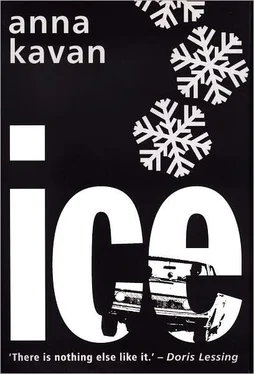Late at night we stopped at a small town. I knocked up a shop keeper, and, for the second time, provided myself with a few essentials: soap, a razor, a change of clothing. The place had only one garage: before we left in the morning, the driver insisted on buying up the entire stock of petrol. The owner protested indignantly; with supplies so restricted, he might not get any more. Our man ignored this, told him to empty the pumps, and, in response to further outraged protests, said: ‘Shut up, and get on with it! That’s an order.’ Standing beside him, I remarked mildly that the next person expecting to fill up here would be in trouble. He gave me a scornful glance. ‘He’s got more hidden away somewhere. They always have.’ The petrol cans were crammed into the back with the rest of the load, hardly leaving room for the four of us. I had the most uncomfortable place, over the back axle.
Flaps were rolled up, we could see out. We were driving towards a distant forest with a chain of mountains behind. A few miles from the town, the metalled road ended. Now there were only two narrow tarred strips for the wheels, as far apart as the width of the chassis. It got colder as we drove on; the climate was changing, like the character of the land. The edge of the forest was always in sight, gradually coming nearer: we passed less and less cultivation, fewer and fewer people and villages. I began to see the sense of storing the petrol. The road got steadily worse, full of ruts and holes. Progress was difficult, slow, the driver kept swearing. When even the tarred strips came to an end, I leaned over and tapped his shoulder, offered to take turns with him at the wheel. Rather to my surprise, he agreed.
I had a more comfortable seat beside him, but found it an effort to handle the heavy lorry. I had never driven one before, and until I got used to it, had to concentrate on what I was doing. It was necessary to stop at intervals to remove fallen rocks or tree trunks that blocked the way. The first time this happened, I prepared to climb out to help the others, who had already jumped down from the back and were struggling to shift the obstruction. I felt a light touch and looked round. The driver’s head made a just perceptible negative movement. My ability to drive the truck had apparently raised me above such duties in his estimation.
I offered him a cigarette. He accepted. I ventured a comment on the state of the road. As the transmitter was so important and involved so much traffic, I could not understand why a decent road had not been made. He said: ‘We can’t afford new roads. We asked the other nations associated with us in the undertaking to contribute, but they refused.’ Frowning, he gave me a sidelong glance to see where my sympathies lay. I said in a non-commital tone that this seemed unfair. ‘Just because we’re a small, impoverished country, they’ve treated us badly all along the line.’ He could not suppress his resentment. ‘The transmitter could never have been built here at all if we hadn’t donated the site. They should remember that we made the whole thing possible. We sacrifice a piece of our land for the general good, but get nothing in return. They won’t even send ground troops to help to protect the position. It’s their unsympathetic attitude that creates bad feeling.’ He spoke bitterly. I could feel his grudge against the big powers. ‘You’re a stranger … I shouldn’t be saying such things to you.’ He looked at me with anxiety: I assured him I was not an informer.
Now that he had begun, he wanted to go on talking. I encouraged him to tell me about himself; it was the way to get him to speak of the things I was interested in. When the project first started, he had driven parties of workers along this road; they used to sing on the way. ‘You remember the old formula—"all men of goodwill to unite in the task of world recovery and against the forces of destruction." They made the words into a sort of part song, men and women singing them together. It was inspiring to listen. We were all full of enthusiasm in those days. Now everything’s different.’ I asked what had gone wrong. ‘Too many setbacks, delays, disappointments. The work would have been finished long ago if we’d had the materials. But everything had to come from abroad; from countries with different standards of measurement. Sometimes parts did not fit together; whole consignments had to go back. You can imagine the effect of such incidents on young enthusiasts, eager to get the job done.’ It was the usual story of mistakes and muddles due to different ideologies, lack of direct contact. I thanked him for speaking frankly about these matters. A ball neatly volleyed, back bounced the cliché: ‘Contact between individuals is the first step towards a better understanding between peoples.’
I seemed to have won his confidence. He became quite friendly, told me about his girl, showed snapshots of her playing with a dog. I considered it unwise to let people know that I carried a sum of money, so drew his attention to something at the roadside while I quickly took out of my wallet the photograph I still kept there of the girl standing beside a lake. I showed it to him, saying that she had disappeared and that I was looking for her. Without any special feeling, he commented: ‘Wonderful hair. You’re in luck.’ I asked rather sharply whether he would think himself lucky if his girl had vanished off the face of the earth, and he had the grace to look slightly embarrassed. I put the photo away, asked if he’d ever seen hair like that. ‘No, never.’ He shook his head emphatically. ‘Most of our women are dark.’ It was no use talking to him about her.
We changed places. I was tired after my stint of driving and shut my eyes. When I opened them again he had a gun lying across his knees. I asked what he expected to shoot. ‘We’re getting near the frontier. It’s dangerous here. Enemies everywhere.’ ‘But this country is neutral.’ ‘What’s neutral? It’s just a word.’ He added mysteriously: ‘Besides, there are various kinds of enemies.’ ‘Such as?’ ‘Saboteurs. Spies. Gangsters. All sorts of scoundrels who flourish in times of disorder.’ I asked if he thought the lorry would be attacked. ‘It has happened. The stuff we’ve got on board is urgently needed. If they’ve got to hear about it they may try to stop us.’
I brought out my automatic, saw him glancing at it with interest, evidently impressed by the foreign weapon. We had just entered the forest. He seemed nervous. ‘This is where the danger begins.’ The tall trees had long grey beards of moss hanging down from their branches, forming opaque screens. It looked a good place to hide. The light was starting to fade, and what was left of it fell on the road, so that it was easy to imagine invisible eyes watching us. I kept a lookout for gunmen, but had other things on my mind.
I spoke to the driver about the warden. He knew only what he had read in the newspapers. The distance to his headquarters from the transmitter was about twenty miles. ‘Can one go there?’ ‘Go there?’ He stared at me blankly. ‘Of course not. It’s enemy country. And they’ve destroyed the road, blocked the pass. There can’t be much of the town left, anyhow. We hear the guns pounding it at night.’ He was more interested in reaching our destination in daylight. ‘We must get out of the forest before dark. We’ll just make it, with any luck.’ He drove furiously, the lorry bounced and skidded over loose stones.
I was too depressed to go on talking. The situation was hopeless. I needed the girl, could not live without her. But I should never be able to find her. There was no road to the town, I should never get there, it was impossible. In any case, the place was under constant bombardment and must have been destroyed. There was no object in going there. She had either left or been killed long ago. I felt in despair. I seemed to have come all this way for nothing.
Читать дальше












